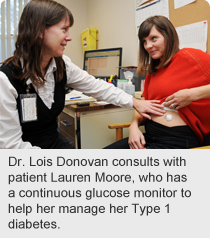
January 20, 2014
Story by Greg Harris; photo by Paul Rotzinger
Canmore resident Lauren Moore finds it handy during a spin-cycle class when the device she uses to monitor her blood sugar level lets her know that it’s dropping.
It means she needs to ease up on the exercise intensity and/or stabilize her blood sugar levels with a glass of juice.
Moore, who is expecting her first child in March, has Type 1 diabetes. She is part of a research study in Calgary that’s testing whether continuous glucose monitors help women with Type 1 diabetes who are pregnant, or planning pregnancy, to better manage their condition.
 “I think the support I get from being in the study has done wonders for my pregnancy,” Moore says. “I’m not as worried about fluctuations in blood sugars that might affect the baby.”
“I think the support I get from being in the study has done wonders for my pregnancy,” Moore says. “I’m not as worried about fluctuations in blood sugars that might affect the baby.”
Calgary is the only Canadian site outside of Ontario taking part in the international trial, which is evaluating the effectiveness of using continuous glucose monitor (CGM) in pregnancy. A CGM system consists of a small sensor inserted in the skin of the abdomen that transmits blood sugar readings every five minutes to a monitor similar to a pager.
“By providing regular, nearly constant feedback, a continuous glucose monitor shows women which way their sugar levels are trending and whether they need to take corrective action,” says Dr. Lois Donovan, Medical Director of Diabetes in Pregnancy in the Calgary Zone of Alberta Health Services (AHS), and principal investigator of the Calgary arm of the study.
“To get the most accurate blood sugar level, women still need to manually draw and test a drop of blood, but a CGM may provide a useful cue for when to do that. For example, blood sugar levels can change rapidly during exercise or while eating,” says Dr. Donovan, also a clinical associate professor with the University of Calgary.
Women with diabetes who wish to conceive or are pregnant need to pay close attention to their blood glucose levels in order to keep their babies healthy and avoid complications in childbirth. High blood sugar levels can lead to higher birth weights and potentially difficult deliveries. Elevated blood sugars before conception and in early pregnancy increase the risk of birth defects for the baby.
Type 1 diabetes is an autoimmune disease in which the immune system destroys the cells in the pancreas that produce insulin, a hormone that helps the body regulate glucose in the blood. Individuals need to take insulin through a needle several times each day to stop sugars from building up. Over time, high sugar levels can cause complications, such as nerve damage.
Researchers with AHS and the University of Calgary aim to enrol between 50 and 60 women. About half will receive a continuous glucose monitor and the other half will form a control group that receives the current standard of care.
Individuals in both groups will regularly meet with clinicians, who will help women optimally manage their diabetes before conception and during pregnancy. Those with the monitors will also be encouraged to adjust insulin dosage based on the rate of change of their blood glucose; they will also have data from their devices downloaded for review.
“It’s important to get the message out that we’re really interested in seeing women before they conceive,” Dr. Donovan says. “If we can help women optimize diabetes management prior to pregnancy, it makes for much better outcomes for both moms and babies.”
The study is supported by the Juvenile Diabetes Research Foundation and the JDRF Canadian Clinical Trial Network. It is being led out of Mount Sinai Hospital in Toronto. In addition to the Calgary site, the study has collaborating sites across Ontario and internationally in the U.S., U.K., Spain, Italy and Israel.
Women with Type 1 diabetes who are planning a pregnancy or who are pregnant can learn more about the Calgary arm of the study by calling 403-955-8358.